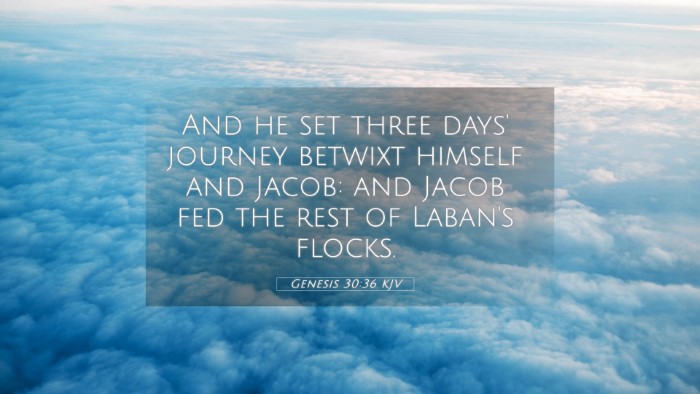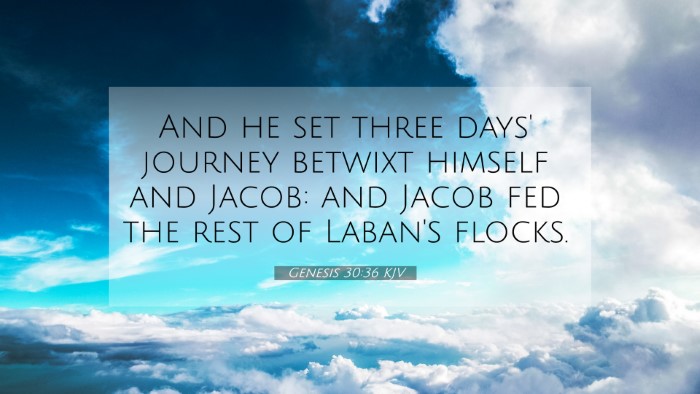Understanding Genesis 30:36
Genesis 30:36 reads: "And he set three days' journey between himself and Jacob: and Jacob fed the rest of Laban's flocks." This verse encapsulates a moment of tension and strategic separation between Laban and Jacob as they navigate their complex relationship as master and servant.
Context of Genesis 30:36
This verse occurs in the broader context of Jacob's manipulation of Laban's flock to gain wealth and independence. Jacob is navigating the rules of his servitude while aiming to secure his future family and prosperity.
Commentary Insights
The insights from prominent public domain commentaries provide a deeper understanding of this verse:
- Matthew Henry: Henry notes that Laban was clever in maintaining leverage over Jacob. The three days' journey between them signifies a strategic distance, indicating the growing tension in their relationship. Jacob’s actions may be interpreted as a way of asserting his own strength while preserving his integrity.
- Albert Barnes: Barnes emphasizes that Jacob's feeding of Laban’s remaining flocks illustrates his diligence and resourcefulness. By separating the flocks, Jacob was also ensuring better control over his breeding practices, which played a crucial role in his eventual prosperity.
- Adam Clarke: Clarke explores the significance of this separation. For Jacob, a distance from Laban allowed him to work independently and build his own household. The verse reflects Jacob's strategic thinking in utilizing what he had been given effectively, all while adhering to the conditions of his servitude.
Thematic Connections within the Bible
This verse illustrates themes of separation and independence, which can be widely observed throughout the Scriptures. Here are some connections:
- Genesis 12:1-4: God's call to Abram to leave his homeland parallels Jacob's journey towards independence.
- Exodus 3:10: God calls Moses to separate from the Egyptians, indicating divine guidance towards independence.
- 1 Samuel 30:16: David’s strategic movements when he faced hostility demonstrate similar themes of distance for safety and tactics.
- Matthew 10:14: Jesus instructs His disciples to shake the dust off from unwelcoming towns, showing the importance of strategic distancing in their ministry.
- 2 Corinthians 6:17: Paul speaks of coming out and being separate, which connects to Jacob's choices throughout his journey.
- John 15:19: The call to be distinct from the world resonates with the decisions Jacob makes for his family’s future.
- Hebrews 11:8: Acknowledging the faith of Abraham, who likewise separated himself from his past for a promised future.
- Revelation 18:4: God's call for His people to come out of Babylon mirrors the idea of separation for safety and holiness.
Bible Verse Cross-References
When delving into cross-references related to Genesis 30:36, consider the following:
- Genesis 31:1-3: Jacob's realization of Laban's thoughts and his subsequent command from God to return to his land.
- Genesis 32:1-2: Jacob's encounter with angels emphasizes divine presence as he prepares to leave Laban.
- Jeremiah 51:6: Calls to flee from Babylon resonate deeply as Jacob flees from Laban.
- Matthew 10:23: The communication of fleeing for safety aligns with Jacob's strategic choices.
Conclusion
In summary, Genesis 30:36 signifies a pivotal point in Jacob's journey—both physically and spiritually. Through analysis across various public domain commentaries, we uncover layers of meaning that highlight themes of independence, strategy, and divine guidance. Understanding the dynamics within this scripture allows for a richer grasp of the interconnectedness of Biblical themes and narratives.
Tools for Cross-Referencing
For those seeking to explore further, utilizing Bible concordance, cross-reference guides, and comprehensive Bible study resources can immensely enhance engagement with the texts.


